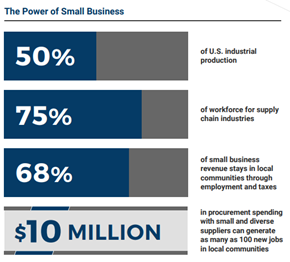As we celebrate National Small Business Month, we wanted to highlight and explore the critical role of small businesses in America’s ongoing industrial transformation that is being fueled by trillions in public and private investments. Now, when you hear of America’s ambitious industrial transformation, it’s critical to note that this isn’t a top-down endeavor. It’s intertwined with the strength and vitality of our small businesses as their contributions help power local economic growth and create good jobs. However, for small businesses to have a seat at the table, we need to mobilize resources and provide them the necessary support from capital to workforce development to help them benefit from this moment. In part one of this post, we explore the impact of small businesses, and in part two, we’ll discuss the solutions needed.
The significant role small businesses play
Across the U.S., 3.7 million small and mid-sized companies supply goods and services to the government or other businesses, working across construction, manufacturing, transportation, and warehousing industries.
Small and mid-sized supplier firms contribute 50% of U.S. industrial production and employ 75% of the workforce in supply chain industries. Companies with fewer than 500 employees have also created approximately two-thirds of jobs over the past 25 years. Moreover, nearly 70% of revenue generated by small businesses stays in local communities, strengthening local economies and fostering economic mobility.
 A lack of tailored support and resources
A lack of tailored support and resources
Despite their role in industrial supply chains and communities, U.S. small businesses have been less productive than larger companies and small firms in other advanced economies. Small and mid-sized supplier businesses lack tailored business support and resources, have difficulty accessing adequate capital, and struggle to recruit and train skilled workers. As a result, the U.S. small business sector lacks the capacity needed to fully participate in the industrial transformation underway. Without a deliberate strategy to support America’s small businesses, we risk falling short of our national goals to build an economy rooted in opportunity and global competitiveness.
- Read part two of our post, “A rallying call to assist small business in America’s industrial transformation.”
- Join Next Street’s Industrial Supply Chain Forum newsletter for more industry insights, news, invites to special events, and more – sign up now (insert link to Mailchimp page).
- Looking for more? Visit our Industrial Supply Chain Forum site for the latest webinars, articles, and more.
To learn more about these programs and potential partnerships with Next Street, contact Spencer Lau at slau@nextstreet.com.
